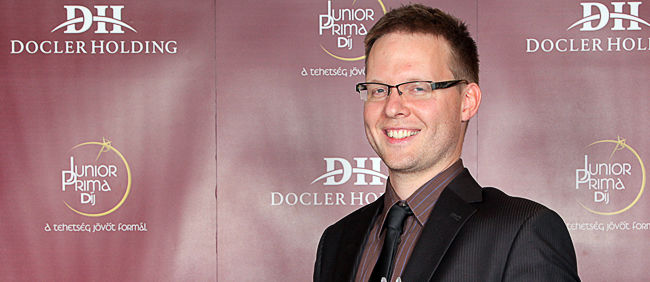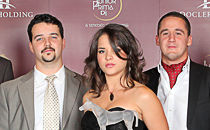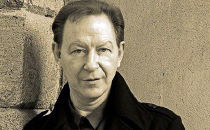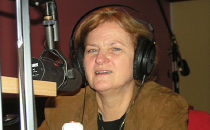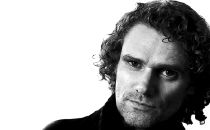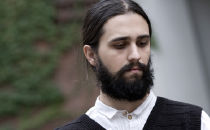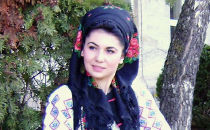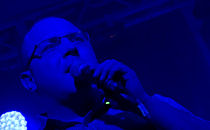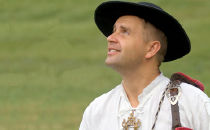Tell me about the beginnings of your group, how it all started…
We started the band four and a half years ago in Budapest. We studied at the the Ferenc Liszt Academy of Music in Budapest. I met there some of the members of my group - a vocalist, Julianna Paár and Gergő Kováts (saxophone, flute, wind instruments). I was previously in one group with András Bognár, a double bass player. I also happened to play with Endre Papp (viola). We started to play the music all together and that is how the whole thing started.
You are the founder and the leader of the group, so please tell me, how you came up with the idea of mixing traditional folk Hungarian music, jazz and chanson?
Because I simply like it, I wanted to try it, I had it in my mind. I could tell you thousands of theories why we play this kind of music, but I’d better say that because I like it, I find it interesting.
How would you describe in one word kind of music that you play?
I cannot.
Could you at least try?
I really don’t like to put the music into the categories, especially our music is not to be put into categories. For example, with Mozart it is clear, it is easy to put his music into category. When you talk about mixture and fusion, you can talk about the categories, but none of them is correct. We play music for which the category hasn’t been created yet, or it is still under construction now. Journalists usually write: traditional Hungarian music, jazz, chanson, bar music, feeling improvisative – these are also the words that they use to describe our music.
Would you agree if they write that you play "world music"?
There is a problem with this term. Twenty years ago the bosses of publishing companies gathered at the conference and all the music that they could not put into their Anglo-Saxon categories decided to call "other". Then they tried to find the nicer phrase, word for it, and they came up with the term "world music". From this perspective, traditional Hungarian music or fusional music that we do is placed in the same category as Polish traditional or fusional folk music. World music is not a style, it is a category, it is just another world for "other music" from Anglo-Saxon perspective. I would say it is a pretty much ignorant phrase, and by the way, a bit chauvinist.
You have realeased one album so far. In Poland we don’t know your music yet so please tell me what kind of material we can find on it. Is it a concept album?
It is called "Arcomba az arcod vésted"- in English "You Etched Your Face In Mine". It is not a concept album, because there is no one idea going through the whole material. It is a collection of different songs, mostly about love, especially about one love, one girl – my wife. There is an English transcription of the lyrics, so every one can understand it. We have also specific graphics to each song. What you can find on the album musically, it is just the same as we talked before – I don’t want to repeat it.
Are the lyrics strict traditional, taken from the folklore or do you write your own texts, only inspired by folklore?
We like to create contrast with different dimensions of the music. For example, if we use jazz standard as an inspiring material, we try to make it sound like a folk song and we put traditional folk song lyrics to it. It sounds like a modern, contemporary melody, but the lyrics seem to be very old for us. So it creates the contrast - this modern harmony and melody versus these old fashioned lyrics.
I hope that people can realise that the traditional and modern culture talk about the same thing: the lyrics of the old songs talk about exactly those things that modern songs talk about; they just use different words and style. When we work with the traditional melody, I mostly write my own lyrics, which are rather contemporary. I would put them in the category alternative rock. Then comes the traditional melody which sounds old and lyrics which sound modern and again, it creates contrast, new associations, new understanding... I hope it brings closer the melody and the lyrics both because people can understand the analogy between the traditional culture and modern, popular one.
You have just said that you write texts. What are they exactly about?
When I write my own texts, I like to use some poetical tools, that are used in the traditional folk songs, but apart from that they are about my feelings and experience. Sometimes we use the traditional lyrics without change.
I haven’t heard your album yet, but I know that the traditional Hungarian music is varied, depending on the region. Is there any specific region that you are inspired by?
The answer would be a little difficult but the question is good. Yes, that’s right, the Hungarian traditional music is varied, depending on the region. But I have no preferences for that. I don’t really care. When I work I use the melodies that I like and I am not interested in their geographical origins. It should be a task for the folklorists. I care only about music itself.
When we talk about regions, there is one thing that I should mention – we don’t use traditional music only from Hungarian regions, we have also one Romanian song. Actually, it is hard to distinguish if it is Romanian, Gypsy or Hungarian. It is because it comes from Transilvania where there is a mixture of these three cultures and every ethnic group uses this song.
You have performed a lot of concerts so far. How is your music received in Hungary?
I hope people like it, some people do, and some not. There is one issue in Hungary – we have a very "controversial" national identity. I don’t know if Polish people suffer from this? National identity in my country is a very sensitive territory. Traditional folk music is a pretty much part of the national identity. If someone touches it, people sometimes react in strange ways. Some people like what we do, some are really angry, because we shouldn’t change the "holy sacra musica" of a great Hungarian nation. But mostly reactions are good.
I can talk about it but it would be a long story and would leads us to another dialogue about media and the whole stuff, why it is not easy to get in the mainstream. But I can say – yes, we have a lot of concerts, people like our music, we are happy musicans from Hungary...
What about concerts abroad?
We have been only to Poland, Romania and Slovakia so far. In Slovakia and Romania it is easy because we play for Hungarian minority there – so it is not very different, we feel like at home. When we come here it is different because here no one understands the lyrics – the music losts a lot from its meaning and it is hard to get over with this thing. When the lyrics are very important for the song, and the song is long and you don’t understand a word, you say: "Oh, c’mon, it is getting boring".
What are your impressions after two concerts in Warsaw (October 2011 and June 2012)?
It is great! I have the feeling that Polish people still like Hungarian people - I hope it is true:). The reactions are good. I would like to talk with Polish people how they liked our performance...
Yesterday [3rd June 2012] the concert was cancelled due to bad weather and moved to another place. It was a great concert in club, people really liked it, were really nice. Last autumn it was a concert during the Hungarian Cavalcade, all kind of these free festivals where people just walk, stop and listen for a bit, then walk forward, eat sth, drink beer... But it was very nice last year to play during Hungarian Cavalcade.
In Poland, contrary to Hungary, we don’t have tradition of departments of traditonal music at the universities. How does this education look like?
It is a pity that in the homeland of Bela Bartok and Zoltán Kodály we needed to wait a century to have traditional music in our Music Academy. Even the first elementary level traditional music school started only in Budapest in 1992. Since that the institutional structure of the education of traditional music has been created. But the story goes back to the amateur "táncház movement". It started in the seventies when some amateur folk dance groups come together to dance the traditional dances not on the stage as a choreography but just for fun. It may not sound revolutionary but it was a revolution of how people looked on the traditional culture. It has created a new paradigm that has changed everything. Before that traditional culture was perceived as old, dead, and distant thing for intellectuals who lived in European urban culture. They only used tradition to get inspiration. But the Táncház movement said: "hey, this is good as it is". This is much deeper then it looks, it is not just music and dance, but this is a way of life and a way of thinking. So the urban intellectuals started to go to the villages, stayed there for some time and tried to learn everything. The music, the dance, the costumes, the dialect - in other words - the whole culture. This is a long story... anyway, these people who started the amateur táncház movement in the seventies built the instituties 30 years later. My generation has grown up in these institutes.
What subjects did you have during the course of your studies?
In the Liszt Academy of Music there is a classical, jazz and traditional faculty. On the traditional music faculty we study traditional music theory that is pretty much different from classical. There are rhythms, intonation, scales that are not used in classical European music. To describe them one needs a different approach. We have also traditional dance classes. If someone wants to play dance music knows the dance is a must. Transcription is to understand, to hear the music. It is also not easy to transcribe instruments like zither or bagpipe or hurdy-gurdy. We have learned folklore to understand the traditional societies and the lyrics of the folksongs better. Knowledge of the repertoire is a subject which enables to see the houndreds and thousands of folksongs in a system. The songs are variants and the close variants form groups - we say styles. It is like the words in a language, it is a fractal. This is the "inner network" of the songs. We study the history of traditional music, European classical music, and the traditional instruments. Also we study esthetics, philosophy, music theory, piano, etc.
How do you recall your cimbalom studies in Kálmán Balog class? Is he a very demanding teacher?
I have become a musician because of him. But this was much before the University. He is my maestro since I am 14. He started to teach me in the beginning of my adolescent years. He is not demanding but inspirative. He is a very sensitive, spiritual and honest man. He gives me examples from Bruce Lee he shows me breathing exercises and even now, when we are colleagues I can ask for everything from him. I greatly adore him.
How would you comment on receving in September 2012 the Junior Prima Award - congratulations!
Oh, thank you! I have had 5 years hard work in this band and it seems the efforts were not worthless. This prize, awarded to young people who contribute to promote arts and traditional culture, may be a milestone after which we may enter the next level. On the other hand, every prize is like the golden apple of discord of the godess Eris.
What are your upcoming plans?
We are working on the second album right now. Some songs are ready, we have already played them live at the concerts in Poland. We have also produced the professional music video - it is called: "Semmi sem hasonlít hozzád" -"Nothing compares to you". It is a great thing because in the traditional music scene there are not so many videos - they are expensive. As I said before, we are still working on the new CD. I hope to finish recordings this year and release the new album in March 2013. In November a song from our teaser maxi Itt a nyár won a songcontest of the Hungarian Jazzy Radio for the best intrumentalisation. In 2013 we will have 42 concerts for high schools, we will play in the Palace of Arts, we will have a hyper-super-mega-giant album premiere show in March, and already have received some invitations for summer festivals. Quite bussy...
Why is your group called Tárkány Művek? I know that “Tárkány” comes from your surname: Bálint Tárkány Kovács.
Yes, that's right. Művek means something like "it works" or "industries". This is not usual name for a band. It expresses that this is like a laboratory where we work and experiment. And also we try different projects like more traditional line with violin, or electronic project with a DJ.
Where can we find information about Tárkány Művek in the web?
Here is our website: http://tarkanymuvek.hu/en/; here you can listen to some of our songs: www.soundcloud.com/tarkanymuvek and I also recommend our youtube channel: www.youtube.com/tarkanymuvek.
Thank you very much for your time and answers!
